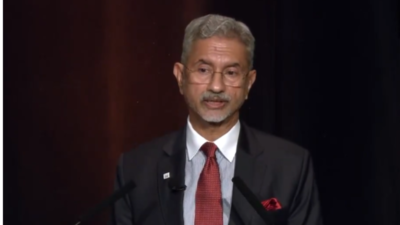- News
- India News
- 'Difficult history': S Jaishankar on India-China relations
Trending
'Difficult history': S Jaishankar on India-China relations
Foreign minister S Jaishankar underscored that India-China relations are crucial for Asia's future and global multipolarity. He noted the success of India's 'Act East Policy' and improving ties with Gulf nations. Jaishankar also mentioned key connectivity projects such as the India-Middle East-Europe economic corridor, envisioning land-based routes from the Atlantic to the Pacific by decade's end.

"We have a difficult history with China...Despite the explicit agreements we had with China, we saw in the middle of Covid that the Chinese moved a large number of forces in violation of these agreements to the line of actual control (LAC).

"When I said 75% of it has been sorted out, it's only of the disengagement. So, that's one part of the problem, he added.
" I think the India - China relationship is key to the future of Asia. If the world is to be multipolar, Asia has to be multipolar and therefore this relationship will influence not just the future of Asia, but in that way, perhaps the future of the world as well," he said.
Jaishankar said that the commencement of Indo-Pacific as a strategic subject had led to the success of 'Act East Policy.'
"We have long pursued the 'Act East Policy' with Asean at its centre. In the last decade, we have seen it mature into something beyond Asean. The arrival of the Indo-Pacific as a strategic subject is the success of the Act East Policy."
He also talked about India's relationship with Gulf and middle eastern countries.
"India's ties with the Gulf have dramatically changed in the last decade," he said.
Pointing out the connectivity proposals between the two countries, he said, "Most notably the IMEC, the India - Middle East - Europe economic corridor. It connects the Atlantic to India and we are in turn trying to also build connectivity to the Pacific through Myanmar which is called the Trilateral Highway. It is conceivable by the end of the decade. We could primarily have land-based connectivity all the way from the Atlantic to the Pacific which runs through Asia..."
Earlier, he met with his counterparts from France, Panama, and Malta, discussing regional issues and ways to strengthen bilateral relations. He is currently in the US to speak at the General Debate of the 79th session of the UN General Assembly on September 28.
End of Article
FOLLOW US ON SOCIAL MEDIA











